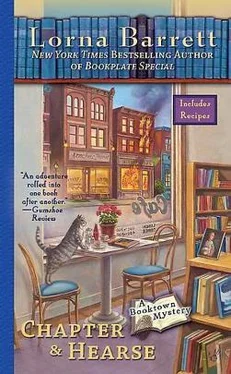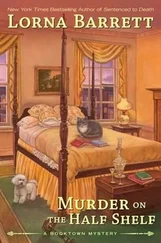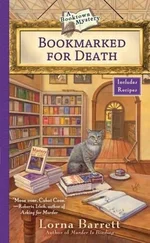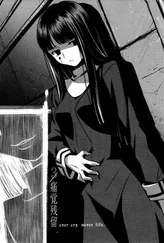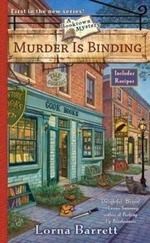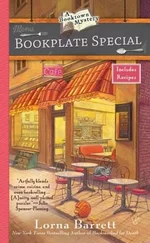“Just make a new pile over there,” Mrs. Roth directed.
Mrs. Roth certainly had been clearing house, as evidenced by the stack of boxes and bags. Tricia wondered if there was anything left to put in Jim’s room to remember him by.
“I’ve got a man coming on Monday to make an offer on some of the books and memorabilia. From what I understand, some of it’s quite valuable.” Mrs. Roth wrinkled her nose. “I never did like having it in the house.”
The phone rang inside the house. “I’ll just go get that,” Mrs. Roth said, and hurried inside.
Tricia took a look around the garage, grateful the door was up and light was spilling into the dusty room. Like the rest of the house, it was neat, with plastic shelves that held household cleaning products, garden tools, motor oil, and . . . a gallon jug of antifreeze in a bright yellow container. Yellow—the color of Mrs. Roth’s lemon bars. Antifreeze, made of ethylene glycol. Poison to man and beast.
For some reason, the sight of it bothered Tricia, especially as she remembered the look on Mrs. Roth’s face when she’d mentioned that the lemon bars had been Jim’s favorite. Tricia looked back through the screen door and into the kitchen, where Mrs. Roth conversed on the phone. In only three days the old lady had practically erased all traces of her son from her home. Could she have wanted him gone? Could she have planned to help him leave this world?
Tricia shuddered, and in the next second berated herself for being foolish. Jim had been killed in an explosion, not by poison. But what if the explosion hadn’t happened? How long would he have lived otherwise?
With Ginny and Mr. Everett already gone for the day, Tricia was ready to pack it in herself. The bell over the door rang, and Tricia looked up, expecting a last-minute customer, but instead Grant Baker stood in the doorway. “Oh, I was expecting a return phone call, not a visit,” she said. He was out of uniform, dressed in a dark green golf shirt and tan Dockers, looking tall, tanned, and tantalizing.
“I happened to be in the neighborhood and thought I’d drop by.”
That was a lie. He lived closer to Manchester than Milford.
“How’s Mandy?” Tricia almost managed to keep the bitterness out of her voice.
“Still in remission, still doing well,” Baker answered.
But not well enough for him to resume a life without her.
Stop it! Tricia told herself. She didn’t want their conversation to follow the previous night’s course.
“You called,” Baker reminded Tricia. “You said you needed a favor.”
“Yes. It turns out my sister has hired a convicted felon.”
“Convicted of what?” Baker asked, interested.
“That’s what worries me. He wouldn’t tell me.”
“Did you ask your sister?”
“She’s out of town on a book tour.”
“Oh, yes, Easy-Does-It Cooking by Angelica Miles. From Penguin. Published June first.”
Tricia laughed. “How did you remember all that?”
Baker scowled. “Because your sister has recited that little speech just about every time I’ve seen her. She’s like a broken record, but I suppose that’s good for sales.”
“Yes, I guess it is.”
“Now, what about this employee? Do you have a name?” Baker asked.
“Jake Masters. He’s her short-order cook, and he also works evenings as a sous-chef at La Parisienne in Nashua. I’m not sure where he lives.”
“That’s not much to go on. Have you got a license plate number?”
“I’ve never seen his car.”
“With all the mysteries you read, you of all people should know what a cop needs to track someone down.”
“Well, I’m hardly in a position to give you his Social Security number.” Ouch! That was no way to win friends and influence people. “I’m sorry. I guess I’m a little on edge. I haven’t had a very good day.”
“You could tell me about it over dinner.”
Tricia blinked. “I could?”
“That is, if you’re not otherwise occupied.”
Tricia gazed around the empty store. Miss Marple sat on the readers’ nook coffee table. She yawned. “I suppose I could change my plans for the evening.”
“And what were you planning on doing?”
“Baking.”
Baker snorted a laugh, then caught himself.
“That was not meant to be funny.”
“I’m sorry, but your gastronomic reputation precedes you.”
She decided to ignore the slur on her cooking abilities. “What did you have in mind?”
“The Bookshelf Diner, if you don’t mind.”
Safe. Secure. And decidedly unromantic. Well, they were, after all, just friends . “Sure. Let me feed my cat, and I’ll be right with you.”
“Fine.”
Leaving Miss Marple in the apartment, Tricia grabbed a heavier sweater and headed back down to Haven’t Got a Clue. Baker was perusing a book, which he put back on the shelf at her arrival.
“Would you like to borrow it?” Tricia asked.
He shook his head. “I barely have time to read the newspaper. Shall we go?”
Baker waited as Tricia locked the door, then ushered her down the sidewalk. “We’ll want to cross at the corner,” he said. “I wouldn’t want to break the law by jaywalking.”
Tricia tried not to smile. She’d admonished him for doing just that soon after they’d met. “Who’d know? I’ve heard the response time for a Sheriff’s Department cruiser for a 9-1-1 call averages twenty minutes.”
Baker frowned. “It’s a sad fact. This is a big county, and our resources only stretch so far.”
“The other day I signed a petition to reestablish a police force in Stoneham. Do you think that’s a good idea?”
They paused at the corner. “I do. The Sheriff’s Department wasn’t eager to take on patrolling this area when the village nearly went bankrupt almost two decades ago.”
“Were you here at the time?”
“Little more than a raw recruit. I’ve got nineteen years in. I can retire next year—that is, if the rules don’t change. A lot of police forces are calling for longer periods of service. Soon officers will need more than just twenty years on the job before taking retirement.”
“Isn’t that fiscally sound?”
“A forty- or fifty-year-old officer can’t run after a suspect like he did fresh out of the academy.”
They crossed the empty street and entered the diner, where they were seated in its front booth for the entire world to see—and in exactly the same seat Tricia had occupied for dinner with Russ just two nights before. Oh, well, Tricia reminded herself, this wasn’t really a date. It was a shared meal with a friend .
Why did that word have to leave a sour taste in her mouth?
Eugenia, the weeknight waitress, was not on duty, which meant Tricia might actually enjoy her meal. Then again, as she perused the uninspiring menu, she decided she might be wrong. It never changed. And the specials always seemed to be the same, too. Couldn’t they offer entrées that didn’t require a deep-fat fryer?
Out of the corner of her eye, Tricia saw a familiar figure walk past the diner’s window: Russ. She looked back down at her menu, hoping he hadn’t noticed her. What was he doing in town? His office had been dark when Tricia and Baker had walked past it.
“The fried chicken looks good,” Baker said, eyes glued to the colored photograph on the menu before him.
“Not if you’re on statins.” She let her gaze stray to the window. Good. No sign of Russ.
“Are you going to live forever?” Baker asked.
“That’s my plan.”
He folded his menu. “I predict you’ll order the Cobb salad.”
“And why’s that?”
“Because you always order the Cobb salad.”
Читать дальше
